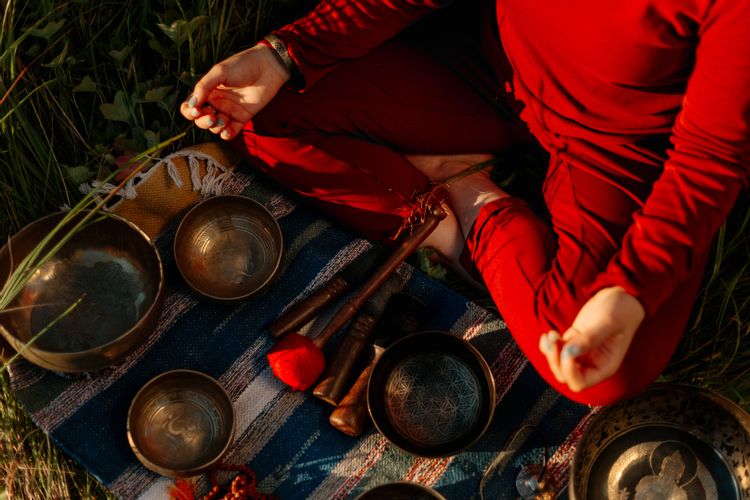Ayurveda is an ancient science of health and healing. Ayurveda recognizes the importance of sleep and it has been called as one of the important pillars of health, the other two being food and correct use of our sensory organs. (1)
In Sanskrit language sleep is called Nidra. According to Charaka Samhita, one of the authoritative texts of Ayurveda, when the mana (mind) including the indriyas (sensory organs) get exhausted and dissociates itself from their objects of interest, then the individual sleeps.(2) lack of good sleep has been described as Nidranash or Anidra.
Anidra is a Sanskrit term formed when a prefix "A" which means "lack of" is added to the term Nidra. Hence Anidra means less or lack of sleep. it has been defined as a pathological condition in which the person is unable to sleep.(3)
Ayurveda considers sleep very important for good health and wellbeing. Sleep has been described crucial to health and happiness. It is nourishing for mind and body, strengthening, aphrodisiac and enhances learning and intellect. (4)
Ayurvedic view of Insomnia
Lack of adequate sleep, poor quality sleep and unable to sleep has been described in Ayurveda as a symptom, as a disorder and even sometimes as a complication of certain diseases. Its symptoms are yawning, body ache, lethargy, head-ache, giddiness, fatigue, indigestion and diseases. (5)
Cause of Insomnia in Ayurveda
The main cause of not getting good sleep is imbalance of Dosha, the three kinds of biological energies called Vata, Pitta and Kapha in mind and body. A balanced function of Kapha Dosha, Tamas, Hridaya and Samjnavaha Srotas are responsible for inducing sleep and when one or more of these are out of balance, it leads to poor quality sleep. (6)
The reason for this imbalance could be due to inadequate food and lifestyle (Aahar and Vihar), emotional factors (Manasika bhavas), improper administration of cleansing or detoxification procedures, and inadequate administration of Panchakarma procedures ( Chikitsa Atiyoga) or other non- specified causative factors (Anya Nidan). (7) (8)
Ayurveda also considers the relation between the age and quality of sleep. With advancing age Vata energy becomes naturally increased in the body. Kshaya (progressive degeneration and decay due to aging or disease) leads to an increase of Vata which in turn compromises the quality of sleep.
Management
Ayurveda understands that key to good sleep and wellbeing is a balance and harmony of mind, body and senses, which are at the same time in harmony and balance with the environment. Body is in a dynamic state and constantly getting influenced by its internal and external environment. living in harmony with its environment is a natural way to treat insomnia.
Ayurvedic approach to managing insomnia in large focuses on:
1. Helping the body re-establish the balance and homeostasis of the three energies- Vata, Pitta and Kapha, Dhatu and metabolic products of the body.
2. Helping the body maintain the balance and homeostasis of these three, and staying in harmony with its own nature and environment.
Ayurveda opposes any sleep-disrupting influence and recommends to balance them with opposites qualities and energetics, at the same time supporting the body's natural balance and circadian rhythm. It targets to achieve this through a combination of diet, lifestyle, herbs, herbal formulations and therapies.
Food
Pathya is a wholesome diet which helps nourish the body, and maintain health. Pathya helps balance the Doshas and helps in getting good quality sleep. Ayurveda recommends eating according to the mind-body constitution to maintain balance is the best way to get good sleep.
Apathya is an unwholesome diet and causes vitiation of Doshas. Light, dry, cold, sour foods are Vata vitiating and Kapha decreasing, they are considered Apathya and should be avoided. Eating very heavy food and fasting frequently also lead to imbalance of mind-body energies and should be avoided.
Ayurveda considers warm, sweet, nourishing food as Vata balancing food. Cooked food made of grains like wheat, rice, black gram, milk and milk products like curd, ghee are considered good for better sleep. Fruits like grapes, preparations made from jaggery and sugar and wine are also considered good. Warm sweet milk at bed time is a recommended healthy drink, as it calms Vata Dosha and induces good sleep. (9)
Lifestyle
Ayurveda emphasizes on establishing a daily routine for balance and harmony.
Daily routine
Having a routine to a day encourages a sense of consistency and fosters a certain stability that is not only grounding, but is also deeply reassuring and calming. Getting up early with the birds and before sunrise, meditation, light exercise, warm bath, self-body massage are some of the daily rituals followed regularly to help the body establish its natural rhythm and help sleep better. A daily routine helps establish a natural sleep- wake cycle by balancing Vata energy.
It is easy to establish a daily routine by setting the time to wake up, going to bed almost the same time every day, and having the main meal of the day around noon every day.
Ayurveda also recommends slowing down as the day advances towards a sun set for better sleep.
Elimination of causative factors
A comprehensive and natural approach is by identifying its causes and eliminating them. Removing the causative factors is the first measure towards correcting the problem, it is called Nidan Parivarjan in Ayurveda. Food, lifestyle habits and other such measures opposing good sleep should be gradually corrected.
An uncomfortable bed, fasting and staying hungry, strenuous exercise and excessive gym workouts, increased sexual indulgence just before bed vitiates Vata causing disturbed sleep. Switching off tv and electronic gadgets after 7 pm and slowing down from evening, having light dinner and a calming gentle massage followed by calming breathing exercise, mantra and meditation can help.
Light and drying food such as barley, leafy vegetables, onion, garlic, ice-cream, and cold drinks also bring an increase to Vata energy, and disturb healthy sleep. These food articles should be avoided in dinner.
Psychological causes like fear, anxiety, anger, excessive joy, sorrow, greed, agitation are also precipitating factors for Vata vitiation in mind.
Therapeutic procedures
Inadequate or excessive administration of Ayurvedic Pancha karma therapies are Vata vitiating, it leads to Anidra/ Nidranasha. It is recommended to take Panchakarma therapies always supervised by expert Ayurvedic practitioners.
Ayurvedic Herbs
It is highly recommended to take Ayurvedic herbs only after consulting an Ayurveda doctor.
Aswagandha- Aswagandha (Withania somnifera) is classified as Rasayan and Rejuvenator in classical Ayurvedic literature. It is renowned for its revitalizing effects. It is a natural adaptogen, nervine tonic, and sedative. Aswagandha is very effective as a natural sleep aid and is commonly used to treat insomnia and sleep disturbances, especially when connected to stress or anxiety. Classically fine powder of its root is used mixed with honey or ghee. It can be also taken along with milk or warm water. (10)
Jatamansi- Valeriana jatamansi, pikenard, is popularly known as jatamansi. Classified as hypno sedative in Ayurveda, it has relaxing and calming attributes which makes it an important ingredient for various sleep inducing Ayurvedic and herbal medicinal products. The stem of the Jatamansi plant is powdered and traditionally consumed with honey, ghee or water.(11)
Brahmi - has been used to describe two distinct Ayurvedic herbs - Centella asiatica and Bacopa monnieri. Brahmi is a Sanskrit word that refers to the feminine essence of universal consciousness as well as the creative potential that emerges from pure awareness. In the west, Centella asiatica is also widely known by its Singhalese name, gotu kola. It encourages a balanced emotional state, promotes daytime energy and nighttime sleep. Whole plant is used in various ways. It can be taken as ghrita, oil, powder, paste, fresh juice, syrup, tea or pill. (12)
Sankhapushpi - Evolvulus Pluricaulis, is a powerful rejuvenator of the mind, supporting the proper function of the brain and nervous system. It promotes memory, concentration and higher cerebral functions. Calms the mind and supports good mental health and emotional stability. Whole plant can be used as powder, paste or juice.(13)
Sarpagandha - Rauwolfia Serpentina, or Indian Snakeroot, is known for its antihypertensive principles and tranquilizing properties. When used as classical preparation in powder form and given along with cow's milk or ghee, it is known to be safe and very effective for insomnia.(14)
Vacha - Acorus calamus, is a nervous system tonic and has calming effects on the brain. It helps relieve mental tension and insomnia. It acts as a coolant that relaxes the nerves and relieves stress, thereby inducing sleep. Powder root of this aromatic herb are classically recommended after purification only.(15)
Herbal formulations - some of the herbal formulations recommended for better sleep are Indumarichadi Vati, Sarpagandha ghan vati, Manas mitra vatakam, Brahmi vati, Sarswatarishta, Brahmi ghrita, Brahmi oil, Mahanarayan Tail etc. (16)
External Ayurvedic therapeutic measures (Bahya Upachara)
According to Ayurveda, sleep disorders are due to imbalance of Doshas, a build-up of faulty diet, weak digestion, lifestyle, stress, and other factors. Vitiation and accumulation of Doshas occur which interfere with the balance and harmony of the body, upsetting body functions at every level, including Mana (mind) and Indriya (senses) and the regulation of sleep. The balance of the Doshs which are the underlying governing forces of the body also becomes disturbed.
Ayurvedic panchakarma therapies help remove impurities, strengthen digestion and metabolism, balance the Doshas, and bolster the body's natural healing mechanisms.(17)
Abhyanga
Ayurvedic massage therapy is called Abhyanga. Sneha abhyanga is massage of the body with herbal or medicated oils. It is one of the best remedies for vitiated Vata. Abhyanga not only balances the Vata but also pacifies Pitta and brings healthy balance to Kapha. Abhyanga helps calm the mind and body. Abhyanga is one of the important therapies for sleep disturbances. (9) (18)
Various types of Abhyanga are recommended for healthy sleep in Ayurvedic classical texts. they can be practiced alone or in combination, as recommended by your Ayurveda doctor. They are-
Sarvanga abhyanga - is a massage of the whole body. Warm herbal/medicated oils are used for Sarvang abhyanga. Its warmth and oiliness brings vitiated Vata back to balance, calms the mind and body. It also helps relieve fatigue and pain. It is very effective bringing relief in anxiety, stress and depression. (9)
Kar and Paad abhyanga - Ayurvedic therapeutic hand and foot massage. It can be administered alone or in combination with other therapies. (9)
Shiro abhyang- Ayurvedic therapeutic head, neck and shoulder massage.
Prishta Abhyanga- Ayurvedic therapeutic back massage.
Shiro lepam - is the process where herbal/ medicated paste is applied over the forehead. It calms the mind, nourishes and strengthens sensory organs.
Shiro Basti - is a type of Murdhni Taila, a method meant for external application of oil over head. It is pooling of the oil over head by constructing a chamber or compartment for a fixed duration of time. Specially designed Shiro Basti cap can also be used. Oil is filled and left for a designated length of time. It helps balance Vata and Pitta energy.
Shiro Pitchu - is also a type of Murdhni Taila, a method meant for external application of oil over head. A small sterile cotton pad or a swab is dipped in medicated oil and kept on the crown of the head for therapy. It is not only Dosha balancing but also nurturing and strengthening.
Shirodhara - An Ayurvedic therapy of gently pouring liquid/oil over the forehead. It is one of the Pancha Karma therapies as well. It alleviates anxiety, reduces headache and induces a relaxed state of awareness. It has been found very effective in anxiety neurosis and hypertension. (19)
Marma therapy - Marma points are the vital points at certain specified places in our body. Ayurveda identifies 107 such points and during Marma Therapy, gentle stimulation of these points are done to remove blockage and release energy to help healing.
Udvartan - Udvartan or Utsadan means to move something upwards. Udvartan is a type of Abhyanga, where massage with oil or herbal paste or powder is done in special strokes. It is a type of therapy that helps balance morbid Vata and Kapha energies in the body. Snigdha Udvartan is specially recommended for Nidranasha.(9)
Akshi Tarpan - Akshi tarpan or Netra tarpan or Netra Basti are different names for the same procedure. It is the pooling of herbal oil or medicinal liquid in specially made compartments around eyes for indicated time. It not only balances the Doshas but also is very nourishing and strengthening for eyes. Ayurvedic texts describe one of the benefits of Akshi Tarpan is good sleep.
Karna Pooran - it is a safe and effective ear therapy of putting oil in the ears. Ayurvedic texts recommend it as a part of a healthy routine, and it can also be done as a therapeutic procedure. It can be done alone or combined with other therapies for the effective management of disturbed sleep.
Yoga
Regular practice of Yoga has been found to reduce tension and anxiety. The following yogic practices are recommended for insomnia; however, these should be performed only under the guidance of qualified Yoga therapists. Duration should be decided by the Yoga therapist.(20) (21)
1. Pranayama - Chandra anuloma viloma, Ujjai, Bhramari, Cooling pranayama and meditation along with the practice of Yama and Niyama.
2. Asana- some of the Asana which can be practiced for are Suryanamaskara, Tadasana, Matsyasana, Mandkasana, Bhujangasana, Padmasana, Paschimottanasana and shavasana
3. Yoga Nidra- The practice of Yoga Nidra is an ancient Yogic technique. Nidra means "sleep", Yoga Nidra is a kind of Yogic sleep. Yoga Nidra promotes rest and relaxation through guided meditation. Following a set of verbal instructions, a state of consciousness somewhere between waking and sleeping is created where the body is completely relaxed, and the person becomes systematically and increasingly aware of the inner world. Practicing Yoga Nidra exercises helps to re-balance an overactive nervous system and soothe emotional anxiety. It helps to address many of the underlying causes of insomnia. (22)
Sleep Hygiene for Beating Insomnia
- Good sleep habits, also called sleep hygiene, can help a person get a good night's sleep and beat insomnia.(m
- Go to sleep about the same time each night. Get up at the same time each morning. Try not to take naps during the day, because naps may make the person less sleepy at night.
- Avoid caffeine, nicotine, and alcohol late in the day. Caffeine and nicotine are stimulants and ward off sleep. Alcohol can cause waking in the night and leads to poor sleep.
- Exercise regularly, it may make one feel tired at night. However, exercise should be avoided within three or four hours from bed time. Exercise before bed makes some people alert and keeps off from falling asleep.
- Avoid eating a heavy meal late in the day. It is good to eat dinner at least 2 hours before bedtime. A light snack before bedtime, however, may help some sleep.
- Make the bed and bedroom comfortable. Be sure that it is dark, quiet, and not too warm or too cold. If light is a problem, try a sleeping mask. If noise is a problem, try earplugs, a fan, or other means to block outside sounds.
- Following a routine helps in relaxing before sleep. For example, reading a book, listening to music, or taking a warm bath are helpful. Practicing meditation before bed may also help.
- Avoid using bed for anything other than sleep.
- If unable to fall asleep or don't feel drowsy, it is better to get up and do something, like reading or other quiet relaxing activity instead of staying in bed unsuccessfully trying to sleep.
- If you find yourself lying awake worrying about things, try making a to-do list before you go to bed. This may help take away worries overnight.
References
1. Chaukhamabha Orientalia, Charak Samhita, Pt. Kashinath Sashtri, Pt. Gorakhnath Chaturvedi, page 227, Sutra Sthana 11/ 35
2. Chaukhamabha Orientalia, Charak Samhita, Pt. Kashinath Sashtri, Pt. Gorakhnath Chaturvedi, P 416, Sutra Sthana 21/ 35
3. M. Monier Williams, A Sanskrit-English Dictionary, Motilal Banarasidas Pvt. Ltd. Delhi, Reprint, 2002; 548.
4. Chaukhamabha Orientalia, Charak Samhita, Pt. Kashinath Sashtri, Pt. Gorakhnath Chaturvedi, P 416, Sutra Sthana 21/36
5. Chaukhamabha Orientalia, Charak Samhita, Pt. Kashinath Sashtri, Pt. Gorakhnath Chaturvedi, P 157, Sutra Sthana 7/23
6. Shree Prakashan, Ayurvediya Sharira Kriya Vigyanam, SK Gaur, P254 Sushrut Samhita Sh. 4/32
7. Agnivesha, Charaka Samhita with Ayurveda Dipika Commentary edited by Vaidya Yadavji Trikamji Acharya, Chaukambha Orientalia, Varanasi 2007 Reprint, Chikitsa sthana, 3/115: 407.
8. Agnivesha, Charaka Samhita with Ayurveda Dipika Commentary edited by Vaidya Yadavji Trikamji Acharya, Chaukambha Orientalia, Varanasi 2007 Reprint, Chikitsa sthana, 28/15; 620.
9. Chaukhamabha Orientalia, Charak Samhita, Pt. Kashinath Sashtri, Pt. Gorakhnath Chaturvedi, P 421, Sutra Sthana 21/ 51-53
10. https://www.ncbi.nlm.nih.gov/pmc/articles/PMC5313221/
11. https://www.ncbi.nlm.nih.gov/pmc/articles/PMC4687238/
12. https://www.ncbi.nlm.nih.gov/pmc/articles/PMC5448442/#B26
13. https://www.ncbi.nlm.nih.gov/pmc/articles/PMC3868798/
14. https://www.ncbi.nlm.nih.gov/pmc/articles/PMC4566472/#b30-40-46
15. https://www.ncbi.nlm.nih.gov/pmc/articles/PMC3456849/
16. https://wjpr.net/admin/assets/article_issue/1505551448.pdf
17. https://www.ncbi.nlm.nih.gov/pmc/articles/PMC3215365/
18. https://www.ncbi.nlm.nih.gov/pmc/articles/PMC6148064/
19. https://www.ncbi.nlm.nih.gov/pmc/articles/PMC3921608/
20. https://www.ncbi.nlm.nih.gov/pmc/articles/PMC3667430/
21. https://www.hopkinsmedicine.org/health/wellness-and-prevention/yoga-for-sleep
22. https://sleep.biomedcentral.com/articles/10.1186/s41606-017-0009-4







